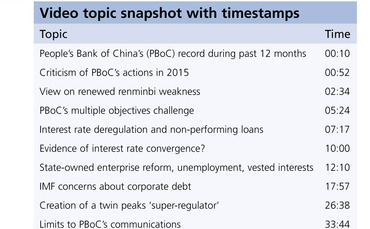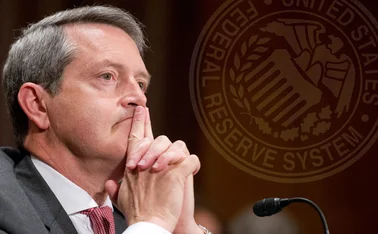
PBoC faces the ‘most challenging work of all central banks’ – HKU’s Xiao
Chinese central bank urged to focus on short-term stability to meet long-term goals
The People's Bank of China (PBoC) has performed well in pursuing exchange rate and price stability in the past six to 12 months, following a rocky period in 2015 where the renminbi fell sharply against the US dollar, according to Xiao Geng, professor of practice in finance and public policy at the University of Hong Kong (HKU). The PBoC's recent performance should help China to achieve its longer-term aims of structural and financial reform.
 Xiao says the PBoC, which has to meet multiple formal objectives – including ensuring price stability, boosting economic growth, promoting employment and broadly maintaining balance of payments, as well as promoting financial reform, opening up and financial market development – faces "the most challenging work out of all the central banks". He says that the need to co-ordinate with the country's State Council makes independent communication by the central bank all but impossible.
Xiao says the PBoC, which has to meet multiple formal objectives – including ensuring price stability, boosting economic growth, promoting employment and broadly maintaining balance of payments, as well as promoting financial reform, opening up and financial market development – faces "the most challenging work out of all the central banks". He says that the need to co-ordinate with the country's State Council makes independent communication by the central bank all but impossible.
But Xiao believes the central bank's work can be broken into two core tasks: maintaining short-term macro stability, which includes exchange rate and interest rate stability; and supporting China's structural reforms and financial opening, which are long-term mandates.
Xiao says that following a period of strong downward pressure on the level on the renminbi last year – which resulted in the PBoC using up hundreds of billions of US dollars of its reserves to shore up the currency – "the PBoC is doing much better, as short-term stability is the priority". "In the last six months, they have stabilised the exchange rate and also relaxed monetary policy to support reforms," he adds.
Renminbi revision needed
The HKU professor, who is also a non-executive director for HSBC China, says it was only "correct" that the PBoC was criticised for its "trial-and-error" policy and communication efforts to ease restrictions on renminbi trading witnessed last year. But Xiao believes allowing the renminbi to weaken after its protracted period of appreciation was always going to be a challenge, whatever the PBoC had said or done.
"The PBoC wants to improve the market mechanism for setting the exchange rate, and that is required by the International Monetary Fund," Xiao says. "But the situation in China at that time was a corner position."
The "corner" was caused by Chinese residents exchanging US dollar assets for renminbi assets over a period of many years because of continued Chinese currency appreciation. This meant that any expectation of a reversal in relative currency strength would result in a "massive outflow of Chinese capital", Xiao says, adding that, over the longer term, it is "right" to allow the renminbi to depreciate, but it "cannot take place over a period of a few days or months".
Xiao adds that he was concerned at the time, but is less worried now, as the PBoC knows it cannot allow a major and continuous devaluation, Chinese property prices in major cities are rising and financial reforms may result in more foreigners buying Chinese assets. Others cite the cautious approach by the Federal Reserve in raising US interest rates as another factor.
"The market is actually working, and that means the possibility of a more stable swap of assets between Chinese and foreigners could happen and on a much more stable exchange rate path," the professor tells CentralBanking.com from his office in Hong Kong.
Financial repression evident, despite rates reform
Xiao adds that interest rate deregulation in China is going "very well", but "there is a long way to go", as there is a "huge gap" between the low funding rates offered to state-owned enterprises (SOEs) by major banks and the higher rates offered to many private companies that are often forced to borrow in the 'shadow banking' market, despite taking on less risky projects. In some productive areas, companies find it "very difficult to get credit", although this has started to change – but at a "very slow pace".
"Financial repression is very serious in China," Xiao says. "It will take some time [before] the interest rate is based on project risks."
Financial repression is very serious in China. It will take some time [before] the interest rate is based on project risks
However, eliminating financial distortions requires more than financial policy, including land and SOE reforms, which Xiao says has been "very slow". This has less to do with concerns about causing mass unemployment – he says unemployment is low in China and the economy can absorb or pay for higher levels – and more to do with powerful vested interests. Xiao claims anti-corruption efforts launched by president Xi Jinping have started to tear down some of these powerful constructs: "You have to control those SOEs, as they are just corrupt and cause trouble."
The HKU professor also believes calls for the creation of a financial super-regulator in China operating a 'twin-peaks' macro and micro supervisory structure – rather than the current siloed banking, insurance and securities approach – are premature. He stresses that it is more important to give regulators independence.
"The challenge is not to create some super-regulator," says Xiao. "The challenge is really in identifying the rights and responsibilities of each party. Then you can talk about a more efficient co-ordination in terms of information-sharing and decision-making... The most difficult part is that the Chinese financial markets are not well defined for rights and responsibilities for all stakeholders, not just for the government."
Only users who have a paid subscription or are part of a corporate subscription are able to print or copy content.
To access these options, along with all other subscription benefits, please contact info@centralbanking.com or view our subscription options here: www.centralbanking.com/subscriptions
You are currently unable to print this content. Please contact info@centralbanking.com to find out more.
You are currently unable to copy this content. Please contact info@centralbanking.com to find out more.
Copyright Infopro Digital Limited. All rights reserved.
As outlined in our terms and conditions, https://www.infopro-digital.com/terms-and-conditions/subscriptions/ (point 2.4), printing is limited to a single copy.
If you would like to purchase additional rights please email info@centralbanking.com
Copyright Infopro Digital Limited. All rights reserved.
You may share this content using our article tools. As outlined in our terms and conditions, https://www.infopro-digital.com/terms-and-conditions/subscriptions/ (clause 2.4), an Authorised User may only make one copy of the materials for their own personal use. You must also comply with the restrictions in clause 2.5.
If you would like to purchase additional rights please email info@centralbanking.com








